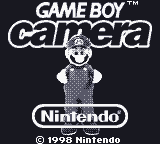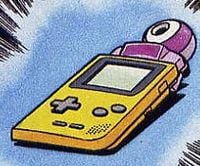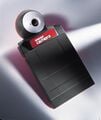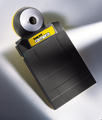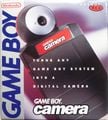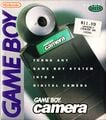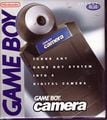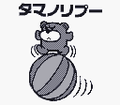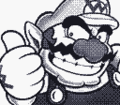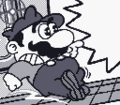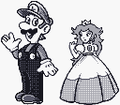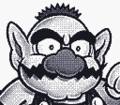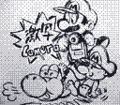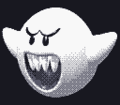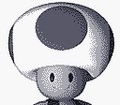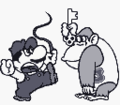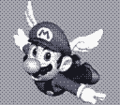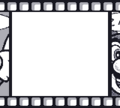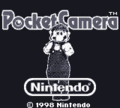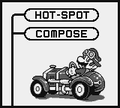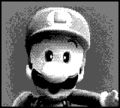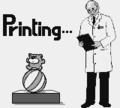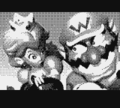Game Boy Camera
Template:System-Infobox Template:Quote2
The Game Boy Camera, known as Pocket Camera (ポケットカメラ, Pokettokamera) in Japan, is an accessory for the Game Boy (and compatible with the Game Boy Color and Game Boy Advance) released in early 1998 which allows the user to take up to 30 grainy monochrome pictures (although that amount can be increased through third-party devices) and view them and edit them on the Game Boy screen and print them out using the Game Boy Printer. Game Freak was involved with its development.
The accessory was discontinued in 2002. Both the camera and the printer contain many references to the Mario franchise.
The Japanese version can connect to Mario Artist: Paint Studio via Transfer Pak.
Blurb
Quoted from the box.
Shoot-View-Play
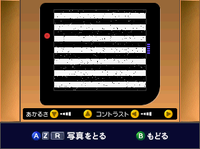
Turn any Game Boy system into a digital camera!
With this accessory, you can shoot photos, doodle
on them, add stamps and even send them to a friend
with another Game Boy Camera!
- Shoot, save and edit 30 different snapshots.
- Arrange your shots into animated sequences.
- Trick Lens mode lets you flip, stretch, zoom
split the screen, and more.- Panorama mode shoots both tall and wide formats.
- Use the Self Timer and Time Lapse modes
to take shots not possible with a standard camera.- Includes 4 minigames: Space Fever II, Ball, D.J.
and Run! Run! Run! You can even put your face
into a game!
Game Boy™ Printer
Look for the Game Boy Printer
accessory when you're ready to
print out the snapshots taken
with your Game Boy Camera.
Special printer paper lets you
turn your photos into stickers!
In other media
A comic called "Rummelplatzquatsch" was made to promote the Camera in Germany, and also featured the Camera heavily.
The comic centers around a Game Boy Camera used by a self-proclaimed fortune-teller to foresee the future. Mario falls for the trick when the Game Boy Camera depicts a toilet brush to him and few seconds later such a brush is dashed into his face indeed. Immediately he buys the Camera, being excited about foreseeing his own future. However, the device only brings misfortune to him. After depicting a cake, one is thrown into his face; after depicting a train, he is run down by one; and so on.
Trying to get rid of the Camera, Mario returns to the fortune-teller who turns out to be Luigi, explaining that it was just a normal Game Boy Camera he sold to his brother, and that it cannot foresee the future. He attempts to prove his point by turning the device on. After it shows Poochy, suddenly a herd of dogs enters the tent. Now Luigi is terrified as well and the brothers run away, dropping the Camera. At the end of the comic, the reader sees Satan's hand grabbing the Game Boy Camera, and it is explained that this is the only copy that has fallen into his hands.
Gallery
The Game Boy Camera put on a Game Boy Pocket
Box art
Album B Pictures
Picture #19 (Japan) - Bear
Picture #17 (International) - Wario
Picture #18 (International) - Mario
Picture #19 (International) - Luigi and Princess Peach
Picture #24 (International) - Tiny Wario
Picture #25 (International) - Mario, Yoshi and Baby Mario
Picture #27 (International) - Boo
Picture #28 (International) - Toad
Picture #29 (International) - Mario and Donkey Kong Jr.
Picture #30 (International) - Wing Mario
Normal and Wild Frames
Wild Frame #1 - Mario
Wild Frame #2 (International) - Super Mario World
Wild Frame #4 - Yoshi's Story
Wild Frame #7 - Mario Kart 64
Mario Stamps
Miscellaneous
Shigeru Miyamoto dancing Easter egg from the credits
Media
Trivia
- In the 1999 edition of the Guinness Book of World Records, the Game Boy Camera was listed as the world's smallest digital camera.[citation needed]
- While the Game Boy Camera features images of popular Nintendo entities, the user is able to access very strange images of people's faces drawn over. These faces can be accessed if the user presses "Run" numerous times, or if the user presses the A Button if they do not have enough frame shots. If this is done correctly, the faces will appear, with a caption saying "Who are you running from?" appearing. If the player tries to exit, the face might reappear, with the sign saying "Don't be so silly!" appearing. These also appear upon other errors, such as linking to an unavailable printer or creating an animation without pictures.
